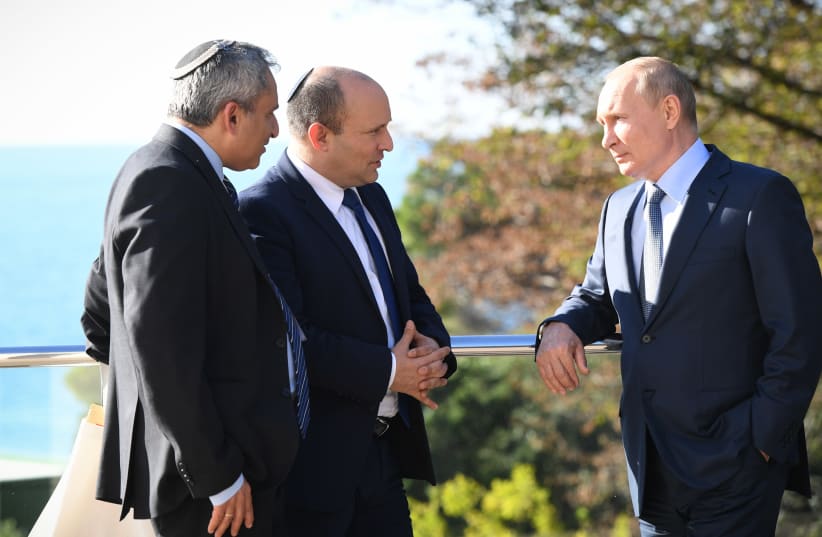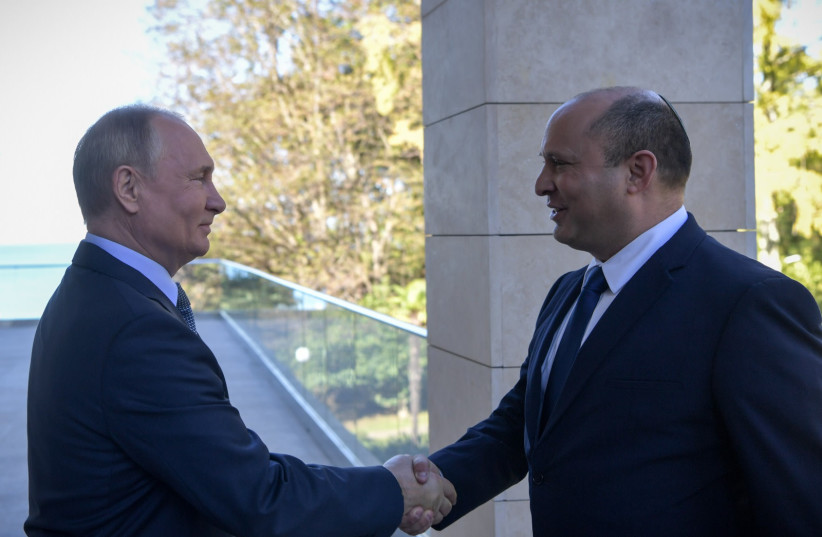Prime Minister Naftali Bennett and Russian President Vladimir Putin agreed to continue the deconfliction mechanism between their air forces when it comes to Israeli strikes in Syria, in their first-ever meeting in Russia on Friday.
Putin invited Bennett back to Russia, to visit St. Petersburg with his wife. He called Bennett on Saturday night, after the prime minister ended up staying in Sochi for Shabbat at the last minute because their meeting went far longer than expected on Friday.
Housing and Construction Minister Ze’ev Elkin, who served as Bennett’s translator, said the central topic of discussion was continuity in relations between Israel and Russia.
“There was a huge conversation on strategic topics,” Elkin said. “They spoke in-depth about the current situation in the Iranian nuclear program, and had a very broad conversation about the situation in Syria, while preserving the coordination system. The prime minister presented his worldview when it comes to the ways to stop the Iran nuclear program and stopping Iran from getting a foothold in Syria.”
The meeting came amid friction in the deconfliction mechanism between Israel and Russia in Syria, where the Russian Army maintains a presence. Israel attacks Iranian targets in Syria in order to stop Iran and its proxies from establishing bases on Israel’s northern border or transferring weapons to Hezbollah.
Bennett and Putin also agreed to speed up work on a trade deal between the countries, and on ways to allow Russian tourists back into Israel before the FDA approves Russia’s Sputnik-V vaccine against COVID. Ahead of the trip, Bennett had considered authorizing tourists who had received Sputnik-V to enter Israel, over the objections of the Health Ministry, as a gesture to Putin.
Elkin, who also translated Putin for former prime minister Benjamin Netanyahu, said the meeting was “one of the warmest and most intimate in the past decade,” and that Bennett and Putin discussed personal matters, “which does not usually happen.”
THE PUTIN-BENNETT meeting was scheduled for two hours, without an overnight stay for the prime minister, but ended up taking five hours. Putin also gave Bennett a tour of the grounds of his vacation home in the Black Sea resort town of Sochi.
Bennett observes Shabbat, and Israeli prime ministers have traditionally not traveled on the Sabbath; as such, he ended up spending one night in Sochi, with food provided by the local Chabad House.
Bennett’s trip to Washington in August was also extended until after Shabbat, after a terrorist attack in Kabul killed US servicemen, forcing US President Joe Biden to postpone their meeting from Thursday to Friday.
Ahead of Friday’s meeting, Putin spoke of problems and opportunities between Russia and Israel.
“There are a lot of problematic topics, but there is also a common denominator and a good opportunity for cooperation, especially – of course – in connection to fighting terror,” Putin said.
Putin told Bennett that it was “important to discuss regional matters with you. As you know, we are making an effort to rehabilitate the infrastructure in Syria.”
Bennett said that “Israel has a million ambassadors, a million Russian-speaking Israelis, who are a great contribution to Israel’s culture, as well as the mentality they bring here of hard work, power, strength.”
Putin commented that Israel may have the largest concentration of Russian-speakers outside the Former Soviet Union.
Bennett said his meeting with Putin is “based on the deep connection between the two nations. We see you as a real friend of the Jewish people.”
Israel and Russia mark 30 years of diplomatic relations this year. The countries established full ties after the fall of the Soviet Union.
Putin said he hopes that “despite the political problems in Israel,” Jerusalem will continue its approach to Moscow, and said that Israel and Russia have a “unique relationship.”
“We had good business relations with the previous government, and we are happy to host the prime minister of Israel here in Russia,” he stated.
The Russian president also said he seeks to further develop hi-tech cooperation between his country and Israel.
The Israeli prime minister referred to the Red Army’s role in defeating Nazi Germany, an important matter for Putin, and Israel’s efforts to commemorate that history, such as the memorial in Jerusalem for those who perished in the siege of Leningrad, which the Russian president dedicated last year.
“As a student of history, one must appreciate the courage in those difficult years for the entire Russian nation,” Bennett said.

